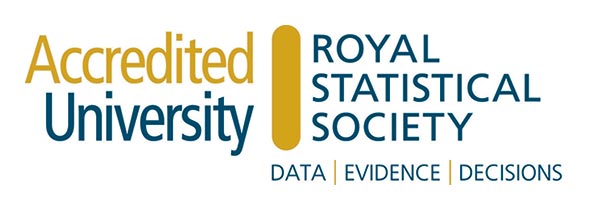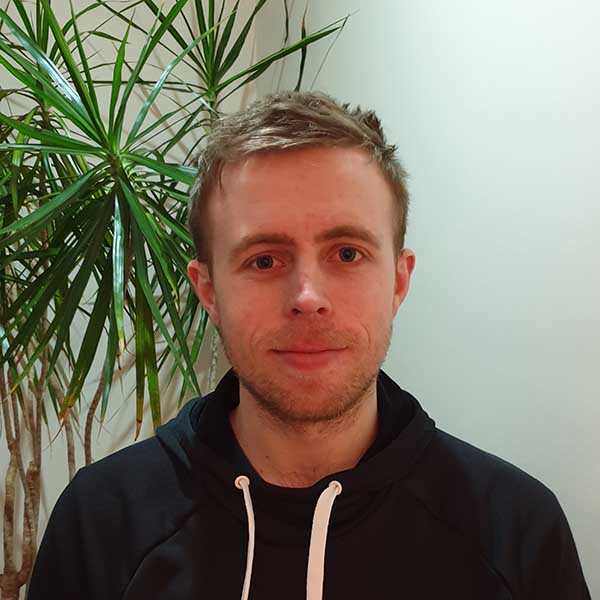MSc Applied Statistics
ApplyKey facts
- Start date: September
- Accreditation: Royal Statistical Society: MSc graduates may qualify for GradStat status
- Study mode and duration: MSc: 12 months full-time
Study with us
- a conversion course for those with a background in a broad range of disciplines
- gain skills in problem-solving, the analysis and manipulation of complex data and use of statistical software packages
- learn to interpret and report the result from data analyses
The Place of Useful Learning
UK University of the Year
Daily Mail University of the Year Awards 2026
Scottish University of the Year
The Sunday Times' Good University Guide 2026
Why this course?
Our MSc in Applied Statistics is a conversion course, offering the opportunity to develop skills in statistics and data analysis even if you have never studies statistics before. You'll be supported by members of staff who work directly with industry to develop skills which are relevant to current areas of research including population health and medicine, animal and plant health, finance and business.
You'll gain skills in:
- problem solving
- analysis and manipulation of complex data
- the use of statistical software for data analysis and reporting
- effective communication of statistics
Programme skillset
On the MSc Applied Statistics programme you'll have the opportunity to acquire:
- an in-depth knowledge of modern statistical methods used to analyse and visualise real-life data sets, and the experience of how to apply these methods in a professional setting
- skills in using statistical software packages used in government, industry and commerce
- the ability to interpret the output from statistical tests and data analyses, and communicate your findings to a variety of audiences including health professionals, scientists, government officials, managers and stakeholders who may have an interest in the problem
- problem solving and high numeracy skills widely sought after in the commercial sector
- practical experience of statistical consultancy and how to interact with professionals who require statistical analyses of their data


What you’ll study
In addition to compulsory modules, there are a range of elective modules, meaning you can tailor the course in line with your career interests.
Semester 1
In semester 1, modules focus on the foundations of statistics. You’ll learn about probability, and basic statistical analysis, as well as developing skills in programming in the statistical programming language R.
Semester 2
In semester 2, modules will build on concepts from semester 1. These will focus on methods of analysis that can be applied to specific areas, such as medical trials, risk analysis, and finance.
Semester 3
In semester 3, you'll undertake a research project in which you'll work on a real-life data set, putting the theoretical skills you have learned into practice.
Learning & teaching
Classes are delivered by a number of teaching methods:
- lectures (using a variety of media including electronic presentations and computer demonstrations)
- tutorials
- computer laboratories
- coursework
- projects
Teaching is student-focused, with students encouraged to take responsibility for their own learning and development. Classes are supported by web-based materials.
Assessment
The form of assessment varies from class to class. For most classes the assessment involves both coursework and examinations.
- The assessment will take ask you to demonstrate your statistical knowledge and skills to analyse real world data and interpret the results in the context of the research question
- Projects will involve writing code, interpreting statistical outputs, and producing a report, or presentation outlining the findings from your analysis
- Group work may be undertaken in some classes
Facilities
The Department of Mathematics & Statistics has teaching rooms which provide you with access to modern teaching equipment and University computing laboratories, with all necessary software available.
You'll also have access to a common room facility which gives you a modern and flexible area for individual and group study work and is also a relaxing social space.
The Department of Mathematics & Statistics
At the heart of the Department of Mathematics & Statistics is the University’s aim of developing useful learning. We're an applied department with many links to industry and government. Most of the academic staff teaching on this course hold joint-appointments with, or are funded by, other organisations, including APHA, Public Health and Intelligence (Health Protection Scotland), NHS Greater Glasgow and Clyde and the Marine Alliance for Science and Technology Scotland (MASTS). We bridge the gap between academia and real-life. Our research has societal impact.

Chat to a student ambassador
Want to know more about what it’s like to be a Science student at the University of Strathclyde? A selection of our current students are here to help!
Our Unibuddy ambassadors can answer all your questions about courses and studying at Strathclyde and offer insight into their experiences of life in Glasgow and Scotland.
Teaching staff
| Staff member | Research Expertise |
|---|---|
| Dr Neil Banas | An oceanographer and mathematical ecologist, with a background in physical oceanography. Current research investigating how climate change affects marine ecosystems and the role of biological complexity (diversity, adaptability, behaviour, life history) in large-scale patterns in the ocean. |
| Dr Bingzhang Chen | Research interest on how biodiversity affects marine ecosystem functioning such as primary production and biological carbon pump, for which the primary producers particularly phytoplankton play the pivotal role. |
| Dr Alison Gray | Research interests cover pattern recognition and machine learning, image analysis, applied epidemiology, SDE models for epidemics, and applications of statistics for honey bee research. |
| Prof David Greenhalgh | Research interests include mathematical and statistical techniques applied to biological problems, in particular mathematical and statistical modelling in epidemiology. |
| Statistical expertise in the analysis and modelling of large observational health datasets with research interest in the fields of public health epidemiology, pharmacoepidemiology and digital health. | |
| Dr Louise Kelly | Part-time Senior Risk Analyst Animal and Plant Health Agency (APHA) with research interests in veterinary and public health risk assessment and mathematical modelling projects relating to e.g. bovine tuberculosis, bovine brucellosis, foot and mouth disease, bluetongue, campylobacter, salmonella and rabies. |
| Prof Chris Robertson | Professor of Public Health Epidemiology in the Department of Mathematics and Statistics, and Head of Statistics at Public Health Scotland. Main research interest is in statistical modelling of infectious diseases and in epidemiological studies. |
| Dr David Young | Part-time Senior Consultant Statistician for NHS Scotland with research interests in design, conduct and analysis of medical research studies. |
| Dr Ainsley Miller |
Teaching Associate with interests in mathematics and statistical pedagogy, in particular easing the transition from school to university and understanding the mental health struggles of students. Member of the core team of the Scottish Qualification Authority's Higher Applications of Mathematics course. Qualified Mental Health First Aider and Sexual Assault First Responder who runs a support service for all mathematics and statistics students. |
|
Ryan Stewart |
Teaching Associate with interest in statistical pedagogical research. Statistical expertise in the linkage and analysis of large administrative datasets in the field of public health epidemiology and policy. Member of Higher Education Academy. |
|
Andrew Browne |
Previous research experience includes analysis of data from clinical trials, observational studies, and systematic reviews. Teaching and pedagogical interests focus on the teaching of statistics to those from other disciplines. |

The training is fast-paced, bringing students up to speed with the necessary practical skills in a very short time period. This means that our graduates are very attractive to government and industry.
Postgraduate Taught Director, Department of Mathematics and Statistics
Course content
- Throughout your studies, you will take 60 credits of compulsory taught classes, 60 credits of elective taught classes, and in the third (summer) term you'll also undertake your MSc Project (60 credits)
- Programmes terms are as follows:
- Semester 1 September to December
- Semester 2 January to April
- Semester 3 April to July
Compulsory classes
Foundations of Probability & Statistics
20 credits
This introductory module is aimed at graduates who have not previously studied statistics at university level. It assumes no prior knowledge of statistics and builds from simple concepts to theoretical methods that are required for application to real life data and problems. The module will provide the foundation elements of probability and statistics that are required for the more advanced modules studied later on.
This will include:
- an introduction to probability and probability rules
- random variables and probability distributions
- data visualisation and representation
- hypothesis testing and confidence intervals
- power and sample size calculations
- correlation and simple linear regression
Data Analytics in R
20 credits
This module will introduce the R computing environment and enable you to import data and perform statistical tests. The module will then focus on the understanding of the least squares multiple regression model, general linear model, transformations and variable selection procedures.
You can expect to cover concepts such as:
- use of functions and packages in R
- use of the tidyverse for data manipulation
- data visualisation using both base R and ggplot2
- multiple linear regression
- using variable selection techniques to cope with large data sets
- more general model comparison
Experimental Design
10 credits
This module provides students with the fundamental principles of statistical modelling through experimental design. The statistical models used in the analysis of balanced experimental designs are derived and used in the analysis of data sets.
You will cover topics such as:
- completely randomised design
- randomised block experiments
- factorial experiments and interactions
- nested designs and repeated measures designs
Multivariate Analysis
10 credits
This module aims to provide students with a range of applied statistical techniques that can be used in professional life to analyse multivariate data. Both statistical and machine learning approaches are included.
You will cover topics such as:
- graphical methods for investigating multivariate data
- logistic regression and discrimination
- linear and quadratic discriminant analysis
- non-parametric classification
- hierarchical and non-hierarchical clustering
- principal component analysis.
Students are required to take at least 10 credits from List A and the remaining 50 credits can be from List A and/or List B modules.
Elective classes
List A
Quantitative Risk Analysis
10 credits
Most people have an intuitive understanding of what risk is. The aim of this module is to formalise this understanding and develop models to quantify risk. Quantification of risk relies on many statistical methods. The emphasis in this course is the practical use of such methods.
You'll develop skills in communicating risk to risk managers as well as formulating practical risk questions that can influence policy decisions.
You can expect to learn about:
- the difference between uncertainty and variability
- quantifying uncertainty using methods such as bootstrapping and Bayesian inference
- selecting appropriate probability distributions based on given scenarios
- fitting probability distributions to data
- building risk models
- communicating your results as written reports
All theory will be implemented practically via computing sessions using the statistical software R. You'll learn to create bespoke functions in R to implement your models and use summary statistics and plots to communicate your results.
Bayesian Spatial Statistics
10 credits
This module will introduce you to Bayesian statistics and the modern Bayesian methods that are used in a variety of applications. Like with other modules, the focus is on real-life data and using statistical software packages for analysis.
You will gain experience in working with the following:
- visualising spatial data
- geospatial data, including methods for prediction
- bayesian modelling using software to implement Markov Chain Monte Carlo
- areal unit modelling
List B
Survey Design & Analysis
10 credits
Surveys are an important way of collecting data. This module will introduce you to the methods that are commonly used in health care to design questionnaires and analyse data resulting from these questionnaires.
You will consider:
- how to design appropriate survey questions
- a variety of sampling methods
- analysing data for different sampling methods
Effective Statistical Consultancy
10 credits
This module covers all aspects of statistical consultancy skills necessary for being a successful statistician working in any research environment. You'll work on real-life problems in small groups and have the opportunity to interact with healthcare researchers to formulate hypotheses.
This module will cover:
- how to engage with professionals working in business, industry and the public sector
- how to apply their statistical knowledge in different situations
- how to effectively communicate statistical results to non-statisticians
Medical Statistics
20 credits
This module will cover the fundamental statistical methods necessary for the application of classical statistical methods to data collected for health care research. There will be an emphasis on the use of real data and the interpretation of statistical analyses in the context of the research hypothesis under investigation.
Topics covered will include:
- survival analysis
- analysing categorical data using hypothesis tests
- experimental Design and sampling
- clinical measurement
Financial Econometrics
10 credits
You'll be exposed to a number of diverse topics in econometrics that can be used to model real financial data, with an emphasis on the analysis of financial time series. The statistical software R is introduced for financial modelling.
You will learn:
- to analyse various financial time series data
- to undertake statistical analysis of financial risk
- to use R for econometric modelling of real financial data
- to use time series models to do forecasting
Financial Stochastic Processes
10 credits
This module aims to expose you to a number of diverse topics in stochastic processes that can be used to model real systems, with an emphasis on the valuation of financial derivatives. In additional to theoretical analysis, appropriate computational algorithms using R are introduced.
You will learn:
- how stochastic models arise
- the concept of a financial options
- how the Black-Scholes equation arises
- how to perform computer simulations based on mathematical models
Data dashboards with RShiny
10 credits
This module will develop your skills in data presentation and statistical communication. You will learn to develop data dashboards, which are increasingly used to allow key stakeholders (and the public) to gain key insights into data via interactive visualisation.
Topics covered will include:
- Creating a data dashboard in RStudio
- User interface design with respect to accessibility
- Creating interactive data visualisations which reflect a specific aim
- Reactive programming in RStudio
- Static programming in R
Statistical Machine Learning
10 credits
This module provides you with the basic theories of machine learning and how to construct a machine model for a real dataset using R. You will also understand the ethical issues regarding data processing and management.
On completion of this module, you will be able to:
- clean data using RStudio and the tidyverse
- understand missing data and the role it plays
- understand ethical issues regarding data processing and management
- carry out single-value imputation
- carry out multiple imputed chained equations in R
- understand and implement artificial neural networks
- understand and implement support vector machines
- understand and implement tree-based classification and regression techniques
- understand and implement ensemble methods
Compulsory classes
Research project
60 credits
The aim of this project is to develop research, teamwork, communication and time management skills. The class will also allow you to learn to critically appraise written work, provide constructive feedback, problem solve using a range of analytic tools, and deepen their knowledge and understanding of an area of research. You will work on independent projects as part of a group. The project supervision will normally involve the groups working closely together with an academic supervisor who will help to shape the project description, aims and objectives. The groups will meet regularly with the supervisor in a group where possible, or on a one-to-one basis. You will also take part in group activities and in individual peer reviews.
Entry requirements
| Academic requirements/experience | Minimum second-class (2:2) Honours degree or overseas equivalent. Mathematical training to A Level or equivalent standard. Prospective students with relevant experience or appropriate professional qualifications are also welcome to apply. For Australia and Canada, normal degrees in relevant disciplines are accepted. |
|---|---|
| Mathematical knowledge | Applicants are required to have some prior mathematical knowledge, eg A Level or equivalent in:
If you have any questions, email (science-masters@strath.ac.uk). |
| English language requirements | You must have an English language minimum score of IELTS 6.0 (with no component below 5.5). We offer comprehensive English language courses for students whose IELTS scores are below 6.0. Please see ELTD for full details. As a university, we now accept many more English language tests in addition to IELTS for overseas applicants, for example, TOEFL and PTE Cambridge. View the full list of accepted English language tests here. |
Pre-Masters preparation course
The Pre-Masters Programme is a preparation course held at the University of Strathclyde International Study Centre, for international students (non-UK/Ireland) who do not meet the academic entry requirements for a Masters degree at University of Strathclyde.
Upon successful completion, you'll be able to progress to this degree course at the University of Strathclyde.
Fees & funding
All fees quoted are for full-time courses and per academic year unless stated otherwise.
Fees may be subject to updates to maintain accuracy. Tuition fees will be notified in your offer letter.
All fees are in £ sterling, unless otherwise stated, and may be subject to revision.
Annual revision of fees
Students on programmes of study of more than one year (or studying standalone modules) should be aware that the majority of fees will increase annually.
The University will take a range of factors into account, including, but not limited to, UK inflation, changes in delivery costs and changes in Scottish and/or UK Government funding. Changes in fees will be published on the University website in October each year for the following year of study and any annual increase will be capped at a maximum of 10% per year. This cap will apply to fees from 2026/27 onwards, which will not increase by more than 10% from the previous year for continuing students.
| Scotland | £12,550 |
|---|---|
| England, Wales & Northern Ireland | £12,550 |
| Republic of Ireland |
If you are an Irish citizen and have been ordinary resident in the Republic of Ireland for the three years prior to the relevant date, and will be coming to Scotland for Educational purposes only, you will meet the criteria of England, Wales & Northern Ireland fee status. For more information and advice on tuition fee status, you can visit the UKCISA - International student advice and guidance - Scotland: fee status webpage. Find out more about the University of Strathclyde's fee assessments process. |
| International | £26,900 |
| Available scholarships | Take a look at our scholarships search for funding opportunities. |
| Additional costs | If you are an international student, you may have associated visa and immigration costs. Please see student visa guidance for more information. |
Please note: the fees shown are annual and may be subject to an increase each year. Find out more about fees.
How can I fund my course?
Scottish postgraduate students
Scottish postgraduate students may be able to apply for support from the Student Awards Agency Scotland (SAAS). The support is in the form of a tuition fee loan and for eligible students, a living cost loan. Find out more about the support and how to apply.
Don’t forget to check our scholarship search for more help with fees and funding.
Students coming from England
Students ordinarily resident in England may be to apply for postgraduate support from Student Finance England. The support is a loan of up to £10,280 which can be used for both tuition fees and living costs. Find out more about the support and how to apply.
Don’t forget to check our scholarship search for more help with fees and funding.
Students coming from Wales
Students ordinarily resident in Wales may be to apply for postgraduate support from Student Finance Wales. The support is a loan of up to £10,280 which can be used for both tuition fees and living costs. Find out more about the support and how to apply.
Don’t forget to check our scholarship search for more help with fees and funding.
Students coming from Northern Ireland
Postgraduate students who are ordinarily resident in Northern Ireland may be able to apply for support from Student Finance Northern Ireland. The support is a tuition fee loan of up to £5,500. Find out more about the support and how to apply.
Don’t forget to check our scholarship search for more help with fees and funding.
International students
We've a large range of scholarships available to help you fund your studies. Check our scholarship search for more help with fees and funding.
International students
We've a thriving international community with students coming here to study from over 140 countries across the world. Find out all you need to know about studying in Glasgow at Strathclyde and hear from students about their experiences.

Careers
We work closely with the University's Careers Service. They offer advice and guidance on career planning and looking for and applying for jobs. In addition they administer and publicise graduate and work experience opportunities.
There are many exciting career opportunities for graduates in applied statistics. The practical, real-life skills that you'll gain means you'll be much in demand in international organisations. A report by the Association of the British Pharmaceutical Industry identified statistics and data mining as “two key areas in which a 'skills gap' is threatening the UK's biopharmaceutical industry.”
Graduates from the MSc Applied Statistics programme have gone on to be employed in a number of different sectors such as:
- Clinical Trials Statistician at Usher Institute
- Data Analyst at Bending Spoons
- Associate Statistician at Thermo Fisher Scientific
- Biostatistician at Optical Express
- Statistician at Phastar (x7)
- Statistician at Quotient Sciences (x3)
- Information Analyst at NHS Scotland
- Statistician at Scottish Government (x4)
- Statistician at Abbots Diabetes Care
- Medical Statistician at University of Oxford
- Credit Risk Analyst at Clydesdale Bank
- Statistical Analyst at Medpace
- Data Scientist at Scottish Water
- PhD studentship in social sciences

The course offered a wide variety of optional courses to choose from which would help to tailor my experience helping to become more specialised and prepare myself for many fields of industry.
Graduate
Apply
Apply for on-campus delivery below or apply to online version of MSc Applied Statistics
Start date: Sep 2026
Applied Statistics (on campus)
Glasgow is Scotland's biggest & most cosmopolitan city
Our campus is based right in the very heart of Glasgow. We're in the city centre, next to the Merchant City, both of which are great locations for sightseeing, shopping and socialising alongside your studies.
Contact us
Have you considered?
We've a range of postgraduate taught and Masters courses similar to this one which may also be of interest.

